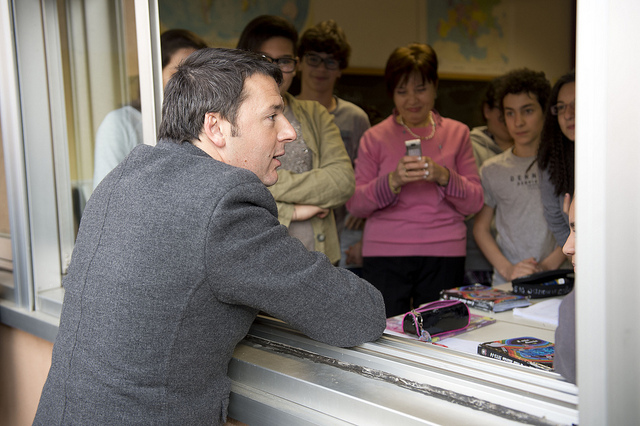Italy’s new Prime Minister is engaged in an unusual, “perfomative” form of political leadership
Italy’s youngest ever Prime Minister Matteo Renzi has embarked on a widespread programme of governmental reform since coming to power three months ago. Chris Bickerton and Carlo Invernizzi Accetti argue that Renzi’s style of leadership, which he terms ‘performative’ is more focussed on being seen as active than it is of focussed on any particular goal or set of goals, a state of affairs which points to a wider transformation transformation of the Italian political left.
It has been almost 3 months since Matteo Renzi was sworn in as Italy’s youngest ever Prime Minister. Having promised to “scrap” the old political system, he rose to power on the back of a swift, merciless and very traditional party coup. This dented the enthusiasm of some of his supporters, but only a little. Since taking power, Renzi has been a favourite of the Italian and the foreign press. The New York Times led a story with a photo montage showing him as Caravaggio’s famous boy with a bowl of fruit. As the caption explained, this was intended to convey the “new sense of prosperity and energy” that the Prime Minister is communicating to the country.
Youth and dynamism have in fact been the principal hallmarks of Renzi’s self-image as Prime Minister. After a long period during which the Italian Left sought to present itself as the more ‘reasonable’ and ‘sober’ alternative to the excesses of Berlusconism, here is finally a politician that looks like he can rival his predecessor in both ebullience and mediatic savoir-faire. For those who thought that the only way to defeat Berlusconi was to come up with a ‘Berlusconi of Left’, this may be a fantasy come true.
But, as ever, when fantasies become real, they often turn out to be less appealing. In order to live up to his image of dynamism and efficacy Renzi promised – even before taking office – to deliver “one major reform a month”. Given that he explicitly posited this as a criterion upon which he wanted his record to be evaluated, it is worth looking at what he has achieved so far.
Renzi’s first target was the electoral law. Just after taking power, he brokered an agreement with Berlusconi to reform this law in order to facilitate the consolidation of a two-party system, thereby ensuring what both Renzi and Berlusconi call ‘governability’. To garner enough support in the chamber of deputies, however, the government was forced to water it down, most significantly in the form of an amendment that makes the law applicable only to the election of deputies in the lower chamber, not in the senate. As many commentators have pointed out, this runs the risk of achieving the opposite result from the one intended: because it effectively means that the upper and the lower chambers would have different electoral laws, thereby making it almost certain that there could never be a stable majority across both.
Renzi’s response was characteristically pugnacious. He claimed that the exclusion of the senate from the electoral reform is not a problem because the second part of his plan is to abolish the Senate anyway. Thus, the reform of the electoral law was put in “stand-by”, in order to tackle the reform of the senate. But, once again, Renzi’s plans were marred by the difficulty of finding a viable majority for passing the reform through parliament. Abolishing the senate requires a change in the constitution and, thus, Renzi has been forced to ask senators to vote for their own abolition. Unsurprisingly, they refused. Far from being able to pass his second big reform within his second month as promised, Renzi is now struggling to get a much more modest proposal – which doesn’t abolish the senate, but only limits the range of its competences – approved.
Conscious of the need to keep things moving, Renzi has decided to inaugurate his third month in office by shifting attention from institutional reforms to the economy. After all, he said, “this is what Italians are really interested in”. In this domain, he succeeded in having a first and very popular bill passed: in essence, a cash transfer whereby everybody’s salary is increased by 80 Euros a month for a year. As Renzi himself conceded, however, the real challenge is to achieve a more lasting and structural reform of the economic system. This is why he announced he would push for a sweeping ‘Jobs Act’ that would radically reform the labour market. When the first draft of this act came out, however, it emerged that it consisted of a list of economic sectors where the government was going to “stimulate job creation”. As soon as it became a matter of specifying the details of such a grand plan, Renzi encountered the usual difficulties, tied to the need for brokering a reliable majority. Far from having this act passed as swiftly as he would have desired, Renzi is currently embroiled in a bitter struggle with the leaders of the main Italian trade unions, who have denounced his way of proceeding about this as “neither left-wing nor democratic”.
On the whole, therefore, it appears that ‘Renzism’ has thus far manifested itself primarily as a merry-go-round of grand proposals for sweeping reform, which never seem to come to fruition but rather feed into one another, before being put on “stand-by”. To give him the benefit of the doubt, it may be that at the end of this big merry-go-round there is a clear and coherent idea of a new Italy. Another take on Renzi, however, is that his political project is – at its heart – performative. That is to say: not about doing something in particular, a coherent vision or a set of specific goals, but rather what matters is the doing itself, i.e. the process more than the outcome. Indeed, Renzi himself has given reason to believe this through the emphasis he has always placed on the notion of fare – doing, which suggests that – even grammatically – the self-perception of this government is rooted in the present continuous tense.
If true, this performative “ideology of doing” points to some deeper changes in Italian politics. In particular, it seems that for Renzi his political constituency only exists in so far as he maintains the reform momentum. It is this very momentum which keeps the constituency alive. This paints a very different picture of the Italian political landscape from the one more familiar to commentators and analysts. In the traditional model, political life was dominated by parties, whose existence was rooted in a set of identifiable social constituencies. These constituencies were not simply based on occupation or wealth; the Left in Italy, for instance, had traditionally played a dominant role in cultural life, with a far weaker role in government. However, in very tangible ways, the divisions and cleavages of Italian society pre-existed the political system itself. Political life consisted of finding arrangements between these groups, formal or informal, public or private.
In contrast to all this, Renzi operates in a very different environment and according to different rules. Heir to the mass-based Italian Communist Party, the Democratic Party of which Renzi is the leader today no longer functions as a representative of the Italian working and lower middle classes. Rather than see himself as the vehicle for the interests of a particular social constituency, Renzi’s political landscape is more discursive, rooted in distinctions such as the ‘old’ versus the ‘new’, or the ‘youth’ versus the ‘old guard’. Many times, Renzi has stressed that such terms should not be understood literally: though young himself, he sees his constituency as one where youthfulness is a condition of the spirit rather than tied to a birth date. To be youthful, according to Renzi, is therefore to be a bearer of change or to think at least in these terms.
There is some echo here of Berlusconi, whose own political discourse relied heavily on the notion of the entrepreneur – not literally a businessman, but rather someone who was entrepreneurial in spirit: a risk-taker, and someone responsible for his own success. Berlusconi, however, cannot be said to have operated in a purely performative sense, nor was his political language rooted in the present continuous. Indeed, if ‘Renzism’ is about fare, then ‘Berlusconism’ was about l’uomo che si è fatto da sé (the self-made man). This implies that Berlusconi’s achievements were rooted in the past, not the future. He had proven himself, he was a made man not a ‘man-in-the-making’.
Understood thus, ‘Renzism’ points to an endless series of reforms, each requiring another but without there being any final goal. In fact, were Renzi to declare that he had ‘done’ what he set out to do, then there would be little reason for him to remain in politics. This strongly performative notion of the political reflects Renzi’s own transformation of the Italian political left, away from the representation of societal interests and towards a subjective, self-sustaining notion of change. Change, for change’s sake, however, looks like it could soon become an empty slogan in the political lexicon of ‘Renzism’.
—
This post represents the views of the author and not those of Democratic Audit or the LSE. Please read our comments policy before posting. the shortenened URL for this post is: https://buff.ly/1nAa8JZ
—
 Dr Chris Bickerton is a University Lecturer in politics at the University of Cambridge, and a Fellow of Queens’ College, Cambridge.
Dr Chris Bickerton is a University Lecturer in politics at the University of Cambridge, and a Fellow of Queens’ College, Cambridge.
 Dr Carlo Invernizzi Accetti is a postdoctoral research associate at the Centre for Political Theory, at the Université Libre de Bruxelles (ULB).
Dr Carlo Invernizzi Accetti is a postdoctoral research associate at the Centre for Political Theory, at the Université Libre de Bruxelles (ULB).






 Democratic Audit's core funding is provided by the Joseph Rowntree Charitable Trust. Additional funding is provided by the London School of Economics.
Democratic Audit's core funding is provided by the Joseph Rowntree Charitable Trust. Additional funding is provided by the London School of Economics.
A rare piece of serious Anglophone insight into Matteo Renzi’s ‘performative politics’: https://t.co/po8Z935oES
Great your site. When i view your article and view your site have good.
I like your site.I have feel good in your content the best.
Article have good on cyber world.
Thank for sharing article.
Thank your again
#Italy’s new Prime Minister is engaged in an unusual, “performative” form of political #leadership https://t.co/9g5juj3xn4 #politics
@barbara_franchi great to see you both-an interesting bit of analysis on Renzi for you https://t.co/x1rmGat1Kh
Is Italy’s new Prime Minister, Matteo Renzi, engaged in activity for its own sake? https://t.co/3PK6YtoT6v
Italy’s new Prime Minister is engaged in an unusual, “perfomative” form of political leadership https://t.co/I9OIcNlqL1
Italy’s new Prime Minister is engaged in an unusual, “perfomative” form of political leadership https://t.co/VT3Em0RnHT
Italy’s new Prime Minister is engaged in an unusual, “perfomative” form of political leadership https://t.co/cAlWP5cqIm